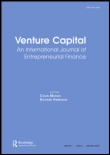
Venture Capital
Scope & Guideline
Navigating the Landscape of Entrepreneurial Finance
Introduction
Aims and Scopes
- Entrepreneurial Finance Research:
The journal focuses on the financial mechanisms and instruments used in supporting entrepreneurship, exploring topics such as equity crowdfunding, venture capital syndication, and the impact of financial literacy on startup success. - Impact of Government Policies:
It examines the role of governmental policies in shaping venture capital landscapes, including analyses of venture capital regulations and public investment strategies across different regions. - Behavioral Aspects of Investment:
The journal investigates the psychological and behavioral factors influencing venture capital decisions, including the role of investor personality traits, social capital, and relationship dynamics in investment outcomes. - Sector-Specific Studies:
There is a consistent focus on sector-specific analyses, including technology, biotechnology, and social impact ventures, evaluating how industry characteristics affect investment strategies and performance. - Comparative Analyses:
The journal frequently conducts comparative studies between regions and sectors, illuminating differences in venture capital practices and their effects on innovation and economic growth.
Trending and Emerging
- Digital Transformation in Finance:
There is a growing emphasis on how digitalization affects venture capital processes, including the impact of technology on funding strategies and startup operations, particularly in the context of COVID-19. - Sustainability and Impact Investing:
Research on sustainable investment practices and impact investing is on the rise, reflecting a broader societal focus on environmental, social, and governance (ESG) factors in venture capital. - Diversity and Inclusion in Funding:
Emerging studies are increasingly addressing the challenges and strategies related to funding for underrepresented groups, including women entrepreneurs and minority-led startups, highlighting the importance of inclusivity in venture capital. - Behavioral Insights in Investment Decisions:
The role of behavioral finance is gaining traction, with researchers exploring how cognitive biases and emotional factors influence venture capitalists' investment choices. - Global Perspectives on Venture Capital:
There is an increasing trend towards examining venture capital through a global lens, with comparative studies across different countries and economic contexts gaining prominence.
Declining or Waning
- Traditional Venture Capital Models:
Research centered on conventional venture capital models is becoming less prevalent as new funding mechanisms like crowdfunding and corporate venture capital gain traction and relevance. - Focus on Early-Stage Financing:
There has been a noticeable decrease in studies specifically targeting early-stage financing, as more attention shifts towards later-stage investment strategies and the complexities of scaling businesses. - Theoretical Frameworks from Previous Decades:
Older theoretical frameworks that once dominated venture capital research are being phased out in favor of contemporary approaches that better reflect the current entrepreneurial ecosystem and its dynamics. - Regional Studies with Limited Scope:
Research focusing solely on specific regions without comparative analysis is declining, as scholars increasingly recognize the value of cross-border insights and global perspectives in venture capital. - Corporate Governance in Startups:
While corporate governance remains an important theme, its specific focus within the context of startups is diminishing as more comprehensive analyses of broader governance issues take precedence.
Similar Journals
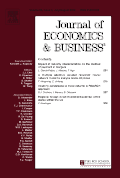
JOURNAL OF ECONOMICS AND BUSINESS
Exploring Contemporary Issues and TrendsJOURNAL OF ECONOMICS AND BUSINESS, published by Elsevier Science Inc, stands as a leading platform for the dissemination of research in the fields of economics and business management. With an ISSN of 0148-6195, this journal is indexed in Scopus and boasts impressive rankings, including a position in the top 20% for both Finance and Economics and Econometrics. With a consistent publication history since 1978, it has become a vital resource for scholars and practitioners alike, providing insights into contemporary issues and emerging trends in the economic landscape. The journal, categorized in the Q2 quartile for both Business and Economics, invites rigorous research that advances theoretical and practical knowledge. While it operates under a subscription model, its notable impact factor reflects its significance and relevance in addressing critical questions within the business and economics domains. Whether you are a researcher, a business professional, or a student eager to deepen your understanding, the JOURNAL OF ECONOMICS AND BUSINESS is an essential resource for your academic and professional journey.
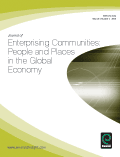
Journal of Enterprising Communities-People and Places in the Global Economy
Illuminating Pathways to Socio-Economic DevelopmentThe Journal of Enterprising Communities: People and Places in the Global Economy, published by Emerald Group Publishing Ltd, is a leading scholarly journal that explores the intersection of entrepreneurship, community development, and economic changes in a global context. With an ISSN of 1750-6204 and E-ISSN 1750-6212, this journal has been pivotal in fostering research that informs policy and practice since its inception in 2007. It enjoys a strong reputation in the academic community, evidenced by its ranking within the Q2 category across multiple fields including Business and International Management, Economics and Econometrics, and Strategy and Management, solidifying its position as a vital resource for researchers, professionals, and students alike. Although it does not currently offer open access, the journal maintains accessibility through a robust publication model that promotes the dissemination of innovative ideas and research findings. With its focus on the dynamic interplay between communities and the global economy, the journal aims to illuminate best practices and challenges in entrepreneurship, making it essential reading for anyone invested in understanding and improving socio-economic development.
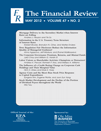
FINANCIAL REVIEW
Exploring the Intersection of Economics and FinanceFINANCIAL REVIEW, a premier journal in the fields of Economics and Finance, is published by Wiley and has been contributing to the body of knowledge since its inception in 1969. With an impressive track record reflected by its Q1 ratings in both Economics and Econometrics as well as Finance, this journal stands out as a crucial resource for researchers, professionals, and students alike. The journal hosts a diverse array of scholarly articles that not only address contemporary financial issues but also provide innovative insights into economic theories and practices. Although it does not offer open access, its high impact factor and strong Scopus rankings—ranking #275 out of 716 in Economics and Econometrics and #125 out of 317 in Finance—underscore its significance in advancing academic discourse and influencing policy in the financial sector. Researchers are encouraged to explore the latest findings and methodologies shared in this esteemed journal, ensuring they remain at the forefront of their fields.
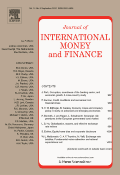
JOURNAL OF INTERNATIONAL MONEY AND FINANCE
Exploring the forefront of monetary economics.JOURNAL OF INTERNATIONAL MONEY AND FINANCE is a premier scholarly publication dedicated to advancing the understanding of international finance and monetary economics. Published by Elsevier Science Ltd, this esteemed journal has been disseminating critical research since its inception in 1982 and will continue to contribute to the field through 2024. With a strong international presence and headquarters in the United Kingdom, the journal boasts an impressive collection of articles that explore significant trends, challenges, and innovations in the areas of economics and finance. Recognized for its impact, it ranks in the top quartile (Q1) in both the Economics and Econometrics and Finance categories as of 2023, signifying its influence and relevance among peers. Researchers, professionals, and students in these disciplines can benefit from the journal's rigorous peer-review process, ensuring high-quality scholarly outputs. Though not currently an open-access journal, it provides various subscription options to foster access to groundbreaking research in the financial ecosystem.

Asia-Pacific Financial Markets
Advancing Knowledge in Asia-Pacific Financial MarketsAsia-Pacific Financial Markets is a distinguished academic journal published by SPRINGER, dedicated to advancing the field of finance research in the Asia-Pacific region. With an ISSN of 1387-2834 and an E-ISSN of 1573-6946, this journal fosters scholarly discourse on contemporary financial markets, investment strategies, and economic policy implications. Situated within the Q3 category in Finance for 2023, it ranks #140 out of 317 in the Scopus database, reflecting its growing significance and impact within the financial research community, as evidenced by its 55th percentile ranking. Since its inception in 1996, the journal has served as a pivotal platform for researchers, professionals, and students alike, featuring rigorous empirical studies and theoretical frameworks that address emerging financial trends and challenges. While it operates under a subscription model, the journal's comprehensive scope and commitment to high academic standards make it an essential resource for anyone looking to deepen their understanding of finance in the dynamic Asia-Pacific landscape.
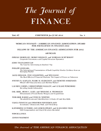
JOURNAL OF FINANCE
Shaping the future of finance through impactful research.JOURNAL OF FINANCE, published by Wiley, stands as a premier academic journal in the fields of finance, economics, and accounting. With a history dating back to 1946, the journal has consistently delivered impactful research that shapes financial theory and practice, boasting an impressive impact factor reflective of its high citation rate. Its Quartile 1 ranking in Accounting, Economics and Econometrics, and Finance illustrates its leading position within these disciplines. Although not an open access publication, the journal continues to be indispensable for researchers, professionals, and students seeking to advance their understanding and knowledge through rigorous empirical analysis and comprehensive reviews. With an esteemed global readership, the JOURNAL OF FINANCE remains committed to fostering the dissemination of innovative financial research well into 2024 and beyond.

Journal of Real Estate Research
Bridging Theory and Practice in Urban StudiesThe Journal of Real Estate Research, published by Taylor & Francis Inc, stands at the intersection of critical analysis in real estate and economic dynamics. With an ISSN of 0896-5803 and an E-ISSN of 2691-1175, this journal covers a diverse range of topics related to real estate, finance, and urban studies. Recognized for its academic rigor, it holds a Category Quartile ranking of Q2 in Economics, Econometrics and Finance and Urban Studies, as well as Q3 in Business, Management and Accounting and Finance for 2023. Its impactful contribution is underscored by its Scopus rankings, placing it within the 45th to 52nd percentiles across multiple categories. As a vital resource for researchers, practitioners, and students alike, the journal aims to publish innovative and theoretically sound research that informs and advances the real estate industry. While it does not currently offer Open Access, it remains pivotal for those seeking to deepen their understanding of real estate dynamics from a global perspective.
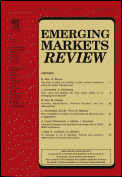
Emerging Markets Review
Empowering Voices in Business and EconomicsEmerging Markets Review, published by Elsevier, stands as a leading platform for scholarly discourse in the fields of Business, International Management, and Economics. With a strong focus on the dynamic and evolving landscapes of emerging markets, this journal boasts an impressive impact factor, reflecting its high-quality research and significant contribution to the academic community. Covering a wide array of topics pertinent to emerging economies, the journal is dedicated to disseminating cutting-edge research findings, theoretical advancements, and practical insights that are essential for both researchers and industry professionals. Operating since 2000, and with its converged years extending to 2024, Emerging Markets Review has secured a Q1 category ranking in both its primary domains (Business and International Management; Economics and Econometrics), underscoring its critical role in shaping knowledge and practices in these fields. The journal's esteemed reputation is further highlighted by its strong Scopus rankings, placing it among the top percentile for relevant subject areas. Although it is not an Open Access journal, it remains accessible through institutional subscriptions, ensuring that the wealth of knowledge contained within its pages reaches a broad audience.
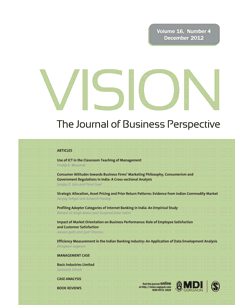
Vision-The Journal of Business Perspective
Advancing Knowledge in Business and ManagementVision - The Journal of Business Perspective, published by SAGE Publications India Pvt Ltd, is a distinguished journal that provides a critical platform for scholarly discourse in the fields of Business and International Management, as well as Strategy and Management. With an ISSN of 0972-2629 and an E-ISSN of 2249-5304, this journal has built a solid reputation since its establishment in 2007 and continues to engage a global audience with its thought-provoking research articles and insightful reviews. The journal holds a reputable position in the academic community, evidenced by its Q3 ranking in both relevant categories as of 2023 and its consistent presence in Scopus with impressive rankings, reflecting its significant contribution to the business field. Although not strictly Open Access, Vision remains accessible to a wide range of institutional and individual subscribers. Researchers, practitioners, and students are encouraged to explore cutting-edge business perspectives that inspire innovative strategies and foster robust discussions, making this journal an essential resource for anyone seeking to deepen their understanding of the dynamic business landscape.

International Studies of Economics
Fostering collaboration through open access research.International Studies of Economics is an emerging open access journal published by WILEY, dedicated to advancing the field of economics, econometrics, and finance. With its first issue released in 2022, the journal aims to serve as a vital platform for scholars, researchers, and practitioners to share innovative insights and contemporary studies. Operating under an open access model since its inception, International Studies of Economics ensures that research findings are widely disseminated, fostering collaboration and accessibility within the academic community. The journal currently holds a Q3 ranking in the category of Economics, Econometrics, and Finance, highlighting its potential for impactful contributions in the field as it converges its content between 2022 and 2024. By addressing a diverse range of topics and employing rigorous methodologies, this journal seeks to enrich economic discourse and guide evidence-based decision making in both public and private sectors. Joining the discourse in this growing field is essential, and International Studies of Economics welcomes submissions that challenge existing paradigms and contribute to the collective understanding of global economic dynamics.